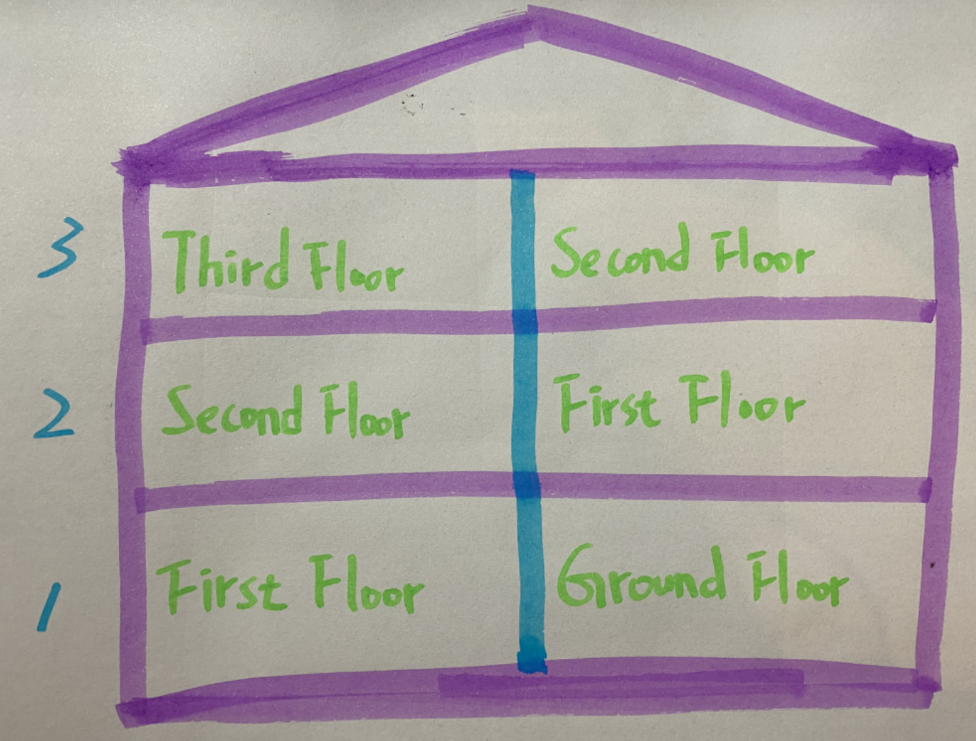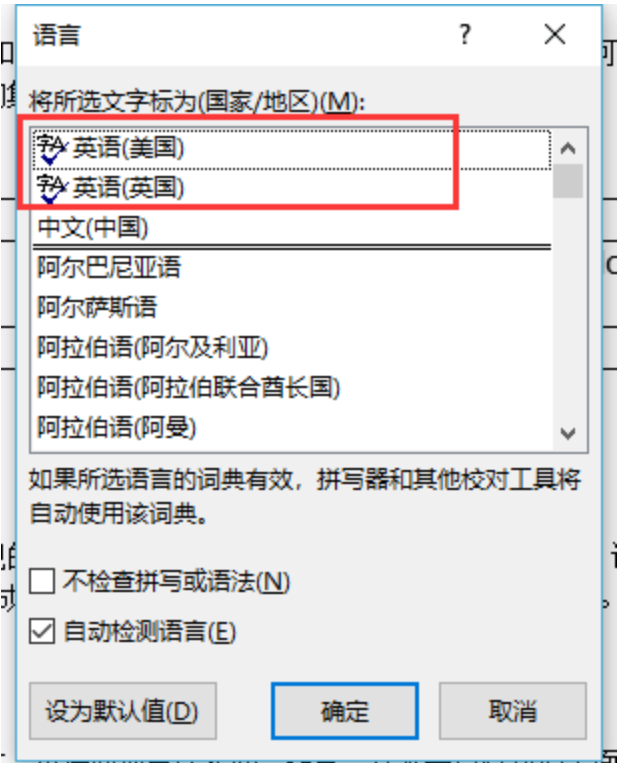C7.1 British vs. American English Differences¶

You must be wondering why there are both British English and American English!
It’s said that one of the reasons dates back to a conscious decision during the compilation of the first English dictionaries in the 19th century. Compilers of American English dictionaries simplified some words and adjusted others based on their own perspectives, distinguishing American English from British English and establishing slightly different linguistic forms.
In particular, an American named Noah Webster believed at the time that the letter "u" was unnecessary, redundant, and somewhat outdated. To make American English more unique, give it a distinct style, and create a language of its own, Webster removed the redundant "u" from words in his dictionary and replaced "re" with "er". For example, "center" in American English corresponds to "centre" in British English, and "theater" matches "theatre", among others.
Over time, some English usages have gradually changed with usage habits. For instance, "needn’t" is commonly used in British English but rarely in American English—Americans tend to use "don’t need to" instead.
Both British English and American English are correct; their spellings and usages are all acceptable. Generally speaking, British English is the standard dialect for both spoken and written English in the UK. While both are usable, it’s important not to mix them in essays or written exams, as this may result in marks being deducted. In other words, if you use British spelling throughout, avoid switching to American spelling.
So, what are the specific differences between American English and British English?
1. Pronunciation Differences
In fact, any language may have different accents in different regions, meaning slight pronunciation variations—but these rarely hinder English communication. Key features of British pronunciation include pronouncing "TH" as "F" and omitting "H" at the start of words (e.g., using "oliday" instead of "holiday"). Londoners also use a specially crafted form of rhyming slang. Americans usually pronounce every "r" in a word, while Britons often only pronounce the first "r".
2. Spelling Differences
中文 | 英式英语 British English | 美式英语 American English | 拼写规则 |
颜色 | colour | color | our → or |
荣誉 | honour | honor | our → or |
劳动 | labour | labor | our → or |
中心 | centre | center | re → er |
剧院 | theatre | theater | re → er |
米/公尺 | metre | meter | re → er |
旅行 | travelling | traveling | ll → l |
顾问 | counsellor | counselor | ll → l |
辩护 | defence | defense | ence → ense |
执照 | licence | license | ence → ense |
目录 | catalogue | catalog | ogue → og |
对话 | dialogue | dialog | ogue → og |
识别 | recognise | recognize | ise → ize |
组织 | organise | organize | ise → ize |
分析 | analyse | analyze | yse → yze |
实践(名词) | practice | practice | ce/ se 统一 |
实践(动词) | practise | practice | ce/ se 统一 |
百科全书 | encyclopaedia | encyclopedia | ae → e |
儿科 | paediatric | pediatric | ae → e |
飞机 | aeroplane | airplane | aero → air |
支票 | cheque | check | que → ck |
灰色 | grey | gray | ey → ay |
3、Vocabulary Differences
British English 英式英语 | American English 美式英语 | 例句 | |
交通出行 | |||
汽油 | petrol | gas / gasoline | I need to fill up with petrol/gas. |
高速公路 | motorway | highway/freeway | Take the motorway/highway to London. |
后备箱 | boot | trunk | Put the luggage in the boot/trunk. |
引擎盖 | bonnet | hood | Check the oil under the bonnet/hood. |
卡车 | lorry | truck | A long lorry/truck passed by. |
地铁 | underground / tube | subway | We took the tube/subway to the city center. |
人行道 | pavement | sidewalk | Don't cycle on the pavement/sidewalk. |
斑马线 | zebra crossing | crosswalk | Cross at the zebra crossing/crosswalk. |
日常生活 | |||
公寓 | flat | apartment | I rent a flat/apartment in the city. |
电梯 | lift | elevator | Take the lift/elevator to the 5th floor. |
一楼 | ground floor | first floor | 英式的一楼是美式的二楼 |
垃圾 | rubbish | trash / garbage | Throw it in the rubbish/trash bin. |
垃圾桶 | rubbish bin | trash can | Please throw the empty bottle in the trash can/ rubbish bin |
水龙头 | tap | faucet | The tap/faucet is dripping. |
手电筒 | torch | flashlight | You'll need a torch/flashlight at night. |
排队 | queue | line | We had to queue/line up for tickets. |
假期 | holiday | vacation | We're on holiday/vacation. |
食物餐饮 | |||
薯条 | chips | French fries | I'd like fish and chips/French fries. |
薯片 | crisps | chips | A bag of crisps/chips. |
饼干 | biscuit | cookie | Would you like a biscuit/cookie? |
糖果 | sweets | candy | Eating too many sweets/candy is bad for your teeth. |
开胃菜 | starter | appetizer | For starter/appetizer, I'll have the soup. |
外卖 | takeaway | takeout | Let's get a takeaway/takeout tonight. |
茄子 | aubergine | eggplant | I bought a fresh eggplant/ aubergine |
西葫芦 | courgette | zucchini | I'm growing zucchini/courgettes in my garden |
服装穿搭 | |||
裤子 | trousers | pants | He wore blue pants/ trousers. Pants英式=内裤;美式=裤子 |
内裤 | pants/ underpants | underwear | He bought new underwear/ underpants |
套头衫 | jumper | sweater | She was wearing a blue jumper/sweater. |
运动鞋 | trainers | sneakers | I bought a new pair of trainers/sneakers. |
背心 | waistcoat | vest | It's just a plain white vest/ waistcoat. Vest英式 = 汗衫/内衣;美式=穿在西装外的马甲 |
尿布 | nappy | diaper | The baby needs a clean nappy/diaper. |
其他常用 | |||
电影 | film | movie | Have you seen this film/movie? |
电影院 | cinema | movie theater | Let's go to the cinema/movies. |
足球 | football | soccer | He loves playing football/soccer. |
简历 | CV | resume | Please send us your CV/resume |
橡皮 | rubber | eraser | Can I borrow your rubber/eraser? 在美式英语中,rubber 口语上一般意思是避孕套。 |
时间表 | Timetable | Schedule | Check the train timetable/ Schedule |
创可贴 | plaster | Band Aid | She put a plaster/ Band Aid on the cut. Band Aid 是品牌名,已被广泛使用。 |
4、Preposition Differences
中文 | 美式英语 American English | 英式英语 British English | 例句对比 |
时间(周末) | on the weekend | at the weekend | 美:What are you doing on the weekend? 英:What are you doing at the weekend? |
时间(一段时间) | through Friday | till/to Friday | 美:I'll be away through Friday. (直到周五结束) 英:I'll be away till Friday. (直到周五) |
地点(在团队里) | on a team | in a team | 美:She's on the soccer team. 英:She's in the football team. |
地点(在街上) | on the street | in the street | 美:I saw him on Main Street. 英:I saw him in the High Street. 美式也用 "in the street" 指"在马路中央"。 |
地点(写信给) | write to someone | write someone (省略to) | 美:I'll write to you soon. 英:I'll write you soon. 美式两种都可,但 "write to" 更正式。 |
时间(周一至五) | Monday through Friday | Monday to Friday | 美:The office is open Monday through Friday. 英:The office is open Monday to Friday. |
其他(与…不同) | different from | different from/to | 美:You look different from your sister. 英:You look different to your sister. 美式 "different than" 也很常见。 |
其他(填表) | fill out a form | fill in a form | 美:Please fill out this application. 英:Please fill in this application. |
其他(见面) | meet with someone | meet someone | 美:Let's meet with the clients. 英:Let's meet the clients. |
5、Simple Past Tense and Present Perfect Tense
美式英语 American English | 英式英语 British English | ||
拥有/关联 | I lost my key. | I've lost my key. | 英式:钥匙丢了,现在还没找到,影响了现在(进不去门)。 美式:常用一般过去时描述这个事实。 |
经历 | Did you eat yet? | Have you eaten yet? | 英式:"你吃过了吗?" 关心的是你现在是否饿。 美式:"你(刚才)吃了吗?" "Did you eat?" 非常普遍。 |
刚刚发生 | He just arrived. | He has just arrived. | 英式:必须与 "have" 连用。 美式:"just" 常与一般过去时连用。 |
副词 "already"/"yet" | I already saw that movie. | I have already seen that movie. | 英式:这些副词通常与现在完成时连用。 美式:常与一般过去时连用。 |
6、The past participle of "get"
美式英语American English | 英式英语British English | |
gotten (常用) | got (几乎唯一形式) | |
表示"获得/得到" | I've gotten a new car. (我得到了一辆新车。) | I've got a new car.(我得到了一辆新车。) |
表示"拥有" | I've got a new car. (我有一辆新车。) | I've got a new car.(我有一辆新车。) |
表示"变得/成为" | It has gotten much colder. (天气变得冷多了。) | It has got much colder. (天气变得冷多了。) 但更常用:It has become much colder. |
表示"必须" | I've got to go now. (我必须走了。) | I've got to go now. (我必须走了。) |
7、Collective Nouns: Singular or Plural?
名词类型 | 中文 | 美式英语 (视为单数) | 英式英语 (常视为复数) |
集合名词 | 团队 | The team is playing well. | The team are playing well. |
公司 | Apple has released a new phone. | Apple have released a new phone. | |
政府 | The government is debating the law. | The government are debating the law. | |
家庭 | My family is large. (指整体) | My family are lovely. (指家人们) | |
机构名称 | 乐队/组合 | Coldplay is on tour. | Coldplay are on tour. |
运动队 | England is a strong team. (指队伍实体) | England are winning the match. (指场上队员) |
8、Regular Verbs or Irregular Verbs?
动词原形 | 中文 | 美式英语 | 英式英语 | |
learn | 学习 | learned | learned / learnt | 美式只用 ed 结尾。英式 ed 和 t 结尾通用,但 t 结尾更传统常见。 |
burn | 燃烧 | burned | burned / burnt | 同上。 |
dream | 做梦 | dreamed | dreamed / dreamt | 同上。 |
spell | 拼写 | spelled | spelled / spelt | 同上。 |
spill | 溅出 | spilled | spilled / spilt | 同上。 |
smell | 闻 | smelled | smelled / smelt | 同上。 |
dive | 跳水 | dived / dove | dived | 这是少数美式英语更不规则的例子。美式英语中 dove 非常普遍。英式英语几乎只用 dived。 |
get | 得到 | gotten (作为过去分词) | got | 这是最著名的区别之一。美式英语用 gotten 表示"得到"或"变得",用 got 表示"拥有"。英式英语在所有情况下都用 got。 |
quit / fit | 退出 / 适合 | quit, fit | quitted, fitted | 美式英语倾向于使用不规则形式(与原形同形)。英式英语则使用规则的 ed 结尾。 |
